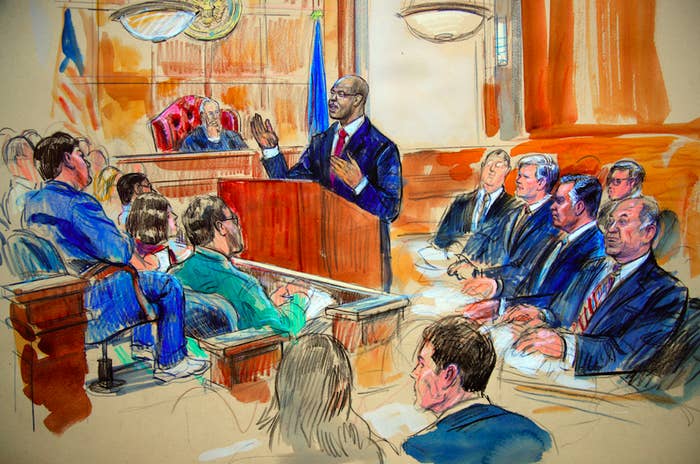
On Thursday afternoon, the jury in Paul Manafort's criminal case heard about Paul Manafort's efforts to apply for a $5.5 million loan. Ultimately, a bank employee testified, the loan didn't happen.
As one of Manafort's lawyers prepared to question the witness, US District Judge T.S. Ellis III spoke up.
"You might want to spend time on a loan that was granted," he chided the prosecutors.
Assistant US Attorney Uzo Asonye paused before he addressed the judge.
"Your honor," he said, "this is a charged count in the indictment" — meaning the witness's testimony was about one of the bank fraud charges against Manafort that the government has the burden of proving at trial.
It was the latest in a string of tense exchanges since the trial began last week between Ellis and prosecutors representing special counsel Robert Mueller's office. Ellis has made clear, including in front of the jury, that he thinks the government is taking too long to put on its case. He's repeatedly told prosecutors to hurry up and expressed his frustration when they've told him how much time they needed to question witnesses.
Some of these exchanges have taken place before the jury is brought in — a time when the lawyers and the judge have more freedom to discuss evidence, and raise grievances, that normally wouldn't be appropriate to talk about before the jury. But sometimes the judge has lashed out at prosecutors in front of jurors, which is unusual. It's not clear what effect, if any, his criticism of prosecutors will have when the jury goes to deliberate.

Ellis, a judge in the US District Court for the Eastern District of Virginia since 1987, has a long-standing reputation for making colorful remarks from the bench and running a tight courtroom. The Alexandria, Virginia, court is known for quickly moving cases through — it's called the "rocket docket." For the most part, prosecutors have kept public displays of frustration to a minimum. But this week, one exchange crossed a line for them.
On Wednesday, Ellis got upset at prosecutors when they put IRS audit agent Michael Welch on the stand and he said he'd been in the courtroom during other witnesses' testimony.
"I thought we excluded witnesses," Ellis said, halting the testimony. The jury was still in the courtroom. Asonye said that was true, except for expert witnesses, which included Welch, and case agents involved in the investigation. Ellis said prosecutors "need to ask specifically," and he told Asonye to remember that next time.
Asonye said he would check the transcript, but believed they had asked the judge for permission. Ellis erupted.
"Let me be clear: I don't care what the transcript says. Maybe I made a mistake. But I want you to remember don't do that again. When I exclude witnesses, I mean everybody," he said.
On Thursday morning, prosecutors filed a motion — the first of its kind in the trial so far — asking the judge for a "curative instruction" to the jury about what happened the previous day. They attached a copy of the transcript from the first day of the trial, July 31, showing they had asked Ellis to allow Welch to stay in the courtroom. At the time, according to the transcript, the judge asked who the agent was, and the government provided his name. The judge said, "All right."
"The Court’s reprimand of government counsel suggested to the jury — incorrectly — that the government had acted improperly and in contravention of Court rules," prosecutors argued in the filing. "This prejudice should be cured."
After the jurors were seated Thursday, the judge addressed them. He said it appeared he may have been wrong in his criticism of the government, but also said he had not checked the transcript.
"I was probably wrong in that. But like any human, and this robe doesn't make me anything other than human, I sometimes make mistakes. And I may have made a mistake there and any criticism to counsel should be put entirely aside," he said.
Throughout the trial, including while the jury is in the room, the judge has repeatedly told prosecutors to "move it along." Early on, he limited prosecutors from presenting evidence about how Manafort used money that they allege he didn't report as income to the IRS — displaying photos of high-priced suits to the jury, for instance, to go along with invoices showing transfers from overseas accounts to those clothing vendors. The photos are part of the record, so the jury will have them when they deliberate, but Ellis curtailed the government's courtroom presentation.
Ellis restricted the amount of time the government could spend establishing what Manafort did to earn the money at issue — namely, delving into the details of his political consulting work in Ukraine. Earlier this week, Ellis called the lawyers to the bench to ask about evidence the government wanted to admit about Manafort's work in Ukraine. The defense hadn't objected. Ellis, in front of the jury, said he wanted to ask the government why it was relevant.
Once the lawyers were at the bench, out of earshot of the jury, Ellis said he had an "objection to the time this is taking." Special counsel prosecutor Greg Andres argued that in order to prove the government's financial crimes case against Manafort, it was relevant to establish to the jury how he earned his money.
"Judge, I disagree that speed is more important than the substance," Andres said, according to a transcript of the bench conference.
"I agree that speed isn't more important than substance, but a delay is unnecessary," Ellis retorted. Andres disputed that the government was delaying the trial.
Ellis is often self-deprecating and has made a point of telling the lawyers that he isn't patient.
"Judges should be patient. They made a mistake when they confirmed me," Ellis told the lawyers Wednesday, amid a dispute about evidence. "I'm not very patient, so don't try my patience."

